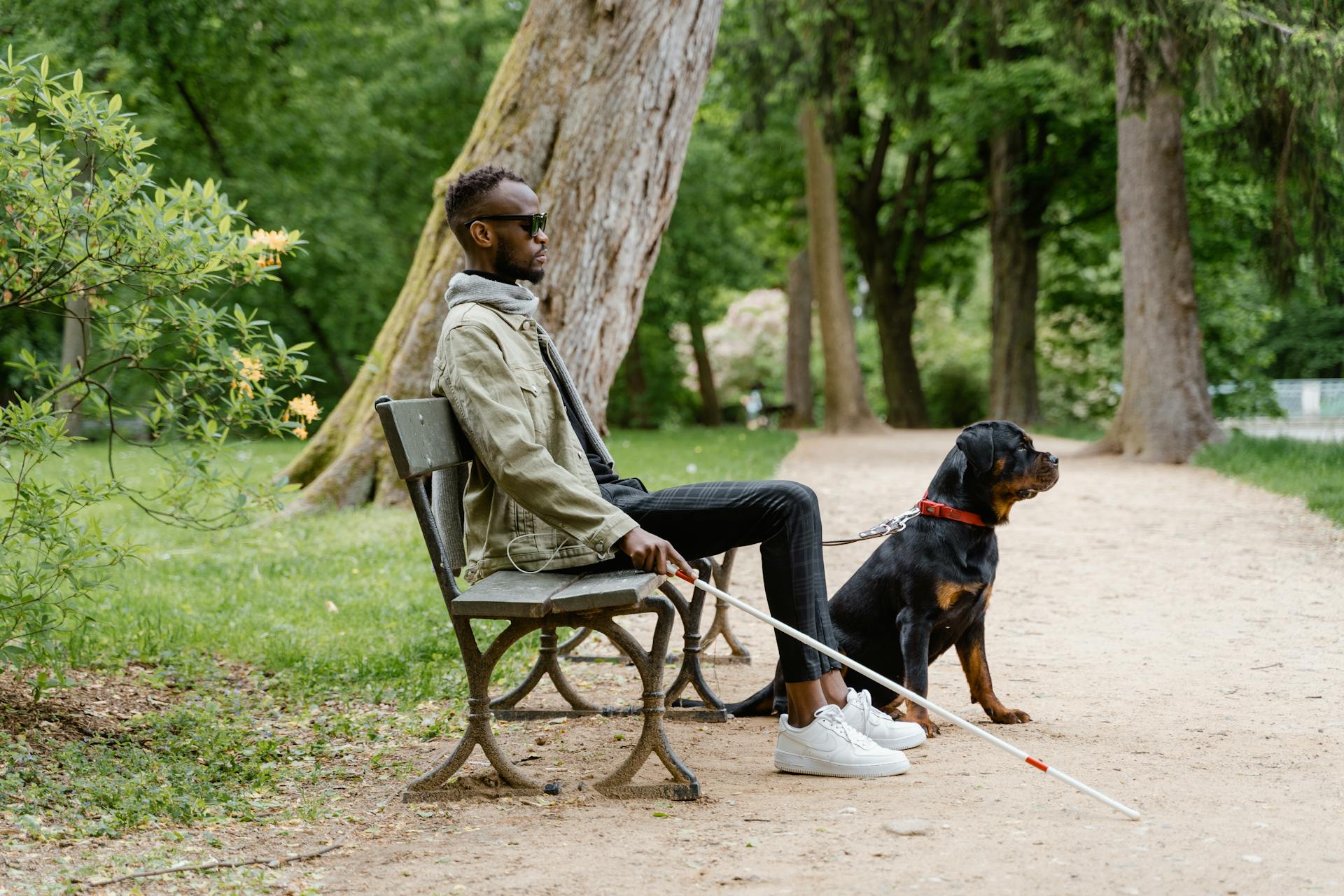
Caring for a blind deaf dog with dementia requires a unique approach to ensure their comfort and well-being.
A significant challenge for seniors like this dog is the risk of falls, which can be prevented by removing tripping hazards and providing a safe, obstacle-free environment.
Their inability to hear or see can make it difficult for them to respond to their name or react to their surroundings, so it's essential to use visual cues like hand signals and vibrations to communicate.
The dog's dementia can cause confusion and disorientation, making it crucial to establish a daily routine that includes regular feeding times, exercise, and play.
A calm and quiet environment can help reduce stress and anxiety, which is especially important for dogs with dementia who may become easily overwhelmed.
By providing a supportive and predictable environment, you can help your blind deaf dog with dementia feel more secure and comfortable.
Here's an interesting read: Do Dog Diapers Help with Potty Training
Dealing with Senior Dogs
Deaf dogs can still feel vibrations, so a strong stamp on the ground may get them to look round at you. This is especially helpful when they're asleep or not paying attention.
You can use a vibration collar to get your dog's attention, it's not a shock collar but one that provides a gentle vibration when you press a button on a remote.
Dogs with limited hearing may not always notice you approaching, so take care when approaching them, especially if they're asleep.
To help your dog avoid hazards, consider placing a uniquely textured mat at places such as the top and bottom step of stairs.
Dogs don't rely on sight as their primary sense, their sense of smell is most important, so they can adapt quite well to blindness.
Many causes of blindness can be addressed by treatment, such as cataract surgery, so you should always take your dog for a physical exam if you notice any signs of vision loss.
Senior dogs may also develop new fears or vocalize more, which can be attributed to increased nervousness.
Some common symptoms of dog dementia include disorientation, house soiling, a change in sleep patterns, and a change in activity levels.
A schedule can help manage the symptoms of dog dementia, so try to stick to a regular routine with your dog.
Explore further: Dog Eye Diseases That Cause Blindness
Here are some tips for managing the challenges of a blind, deaf dog with dementia:
- Keep the layout of your home the same to avoid confusion
- Check for hazards regularly, such as loose cables or clutter
- Use sound to alert your dog to your presence before approaching them
- Provide mental enrichment to help manage symptoms of dementia
Lessons from a Blind & Deaf Dog
Dealing with a blind and deaf dog requires extra attention to safety and communication. Teaching hand signals for key commands like 'come', 'sit', and 'stay' is crucial, ideally starting while they still have some hearing.
You can begin by making the hand signal whenever you say the command, and eventually progress to using the signal only. This will help your dog associate the signal with the action.
A strong stamp on the ground can get your dog's attention, as they can still feel vibrations. You can also wave in front of their face, or consider a vibration collar for added assistance.
Approaching your dog with caution is vital, especially if they're asleep or startled. Heavy footsteps can alert them to your presence, but be mindful of young children who may not understand the importance of quieting down.
A deaf dog may not notice you approaching, so take care to walk with heavy footsteps and keep them away from the edge of the sidewalk.
Senior Dog Care
As your dog ages, it's essential to consider their changing needs, particularly if they're dealing with sensory loss. Dogs with limited hearing may not always notice you approaching, so it's crucial to take care when approaching them, especially if they're asleep.
You can help your dog adapt to hearing loss by teaching them hand signals for key commands like 'come', 'sit', and 'stay'. This can be done by making the hand signal whenever you say the command, and eventually progressing to using the signal only.
To keep your dog safe outside, never let them off the leash when out for walks, and keep them well away from the edge of the sidewalk, as they may not be able to hear dangers such as traffic or cyclists.
Here are some tips for minimizing the impact of hearing loss on your dog's daily life:
- Use hand signals for key commands
- Find alternative ways to get your dog's attention, such as a vibration collar
- Approach with caution, especially when your dog is asleep
- Keep your dog safe outside by keeping them on a leash and away from hazards
Dealing with Dementia
Dog dementia, also known as canine dysfunction syndrome (CDS), is not uncommon in senior pooches. One study revealed that signs of dog dementia increased to 68 percent in dogs aged over 15 years.
It's heartbreaking to watch our furry friends decline in health, especially when they forget their usual routines. Gerard's experience with his dog Piper is a poignant reminder of this.
Symptoms of dog dementia usually include disorientation, house soiling, a change in sleep patterns, and a change in activity levels. Owners may also see a change in their relationships, as a once independent dog may become clingier for example.
Senior dogs may also develop new fears or vocalize more, which can be attributed to increased nervousness. This was evident when Piper got stuck in the hallway, unable to see where he was going.
Sadly, there is no cure for dog dementia or CDS, but owners can help manage the symptoms by providing a schedule their dog can follow and giving them plenty of mental enrichment.
Senior Dog Forgets Greeted Owner
Dealing with a senior dog's memory loss can be heartbreaking, as seen in the story of Piper, a 17-year-old dog who forgot his owner had already greeted him at home. This is not uncommon in senior dogs, as one study revealed that signs of dog dementia increased to 68 percent in dogs aged over 15 years.
Dog dementia, also known as canine dysfunction syndrome (CDS), can cause a range of symptoms, including disorientation, house soiling, and a change in sleep patterns. Owners may also notice a change in their dog's relationships, such as becoming clingier or developing new fears.
Senior dogs may also vocalize more due to increased nervousness, and some may experience sundowner syndrome, where they sleep more during the day and become restless at night. This can be attributed to cognitive deterioration.
While there is no cure for dog dementia or CDS, owners can help manage the symptoms by providing a schedule their dog can follow and giving them plenty of mental enrichment. This can include activities like obedience training, scent work, and interactive puzzle toys.
Frequently Asked Questions
What is the final stage of dog dementia?
The final stage of dog dementia is characterized by severe disorientation, leading to erratic behaviors such as excessive barking and pacing. In this stage, dogs may also become unresponsive to familiar commands and names.
Sources
- https://www.smalldoorvet.com/learning-center/seniors/mobility-deafness-blindness-dementia-senior-dogs/
- https://www.newsweek.com/blind-deaf-rescue-dog-dementia-realizing-owner-arrives-home-viral-tiktok-1842009
- https://www.newsweek.com/senior-dog-forgets-hes-greeted-owner-already-1893636
- https://iheartdogs.com/piper-dennis/
- https://letyourlovegrow.com/blogs/blog/lessons-learned-from-a-blind-deaf-dog
Featured Images: pexels.com


